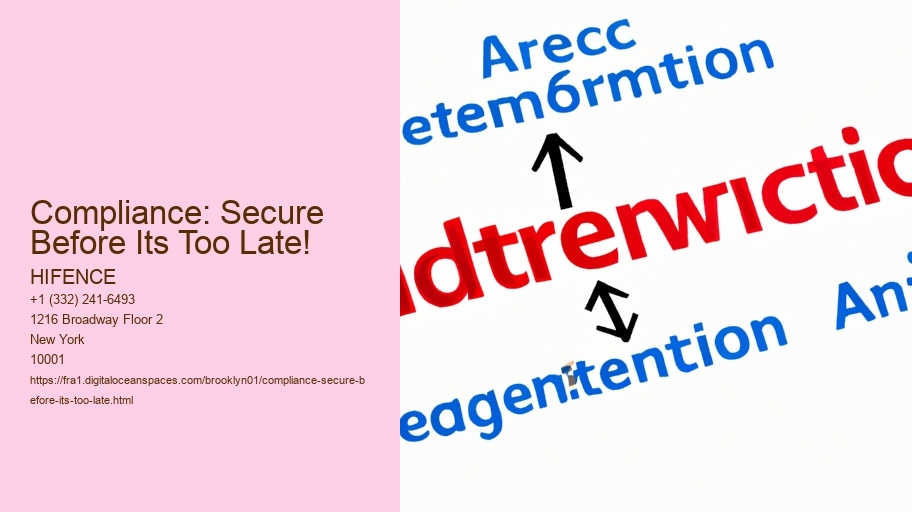
Okay, so, like, understanding how compliance is changing? Avoid Disaster: Security Compliance Verification . Its kinda a big deal, right? Its not just about ticking boxes anymore, although, you know, the ticking boxes part is still important. But its more about seeing whats coming down the line, the new rules, the new threats, and all that jazz.
Think of it this way. Imagine building a house, but you only followed the building codes from, like, ten years ago! Your house probably wouldnt be very safe, or efficient, or, well, legal! Compliance is the same. The worlds changing fast, especially with all this tech stuff, and the rules are trying to keep up, sometimes clumsily, but theyre trying.
So, staying secure before its too late?
And lets be real, its not always easy. Theres so much information, so many regulations, it can be overwhelming! But its better to be a little overwhelmed now then to get slapped with a massive fine, or worse, a data breach that ruins your reputation. Its an ongoing process, a constant learning curve. But hey, at least its never boring! Secure your stuff!
Compliance: Secure Before Its Too Late! Proactive Security Measures: A Compliance Foundation
Lets face it, compliance can feel like a real drag. Like a never-ending to-do list of regulations and paperwork. But, thinking about compliance as just a checkbox exercise is, well, its a recipe for disaster. We gotta shift our thinking! Compliance isnt about reacting after something goes wrong, its about being proactive and building a secure foundation from the ground up.

Proactive security measures are the key. Were talking about things like regularly assessing risks, patching systems before vulnerabilities are exploited, and training employees to spot phishing scams.
Think of it like this: you wouldnt wait for your house to catch fire before installing smoke detectors, would you? No way! Proactive security is the smoke detector of the digital world. It helps us catch potential problems early, before they turn into full-blown compliance nightmares.
And its not just about avoiding fines or bad PR, either. A strong security posture builds trust with customers, protects valuable data, and ultimately, makes our business more resilient. When we prioritize security, were not just ticking boxes, were investing in our future.
Okay, so, data protection and privacy regulations, right? Its kinda a mouthful, but seriously important, especially when were talking about compliance. Think of it like this: your data is, like, your digital stuff. Your photos, your emails, your bank details, all that jazz. And these regulations? Theyre the rules about how companies and organizations are allowed to handle that stuff!
Now, "Secure Before Its Too Late!" check Thats not just some catchy slogan. Its the truth! managed services new york city If you dont take data protection seriously upfront, youre just asking for trouble. Big trouble. I mean, imagine your credit card details getting leaked because a company didnt bother with basic security. Nightmare fuel!

Compliance isnt just about ticking boxes either. Its about building trust. People are more likely to do business with you if they know youre not going to be careless with their personal information. And these days, folks are getting smarter about this stuff. Theyre paying attention to whos respecting their privacy.
Plus, the fines for violating these regulations can be huge! Like, company-bankrupting huge. So, really, its worth investing in good security measures, training your staff, and generally making sure youre on the right side of the law. Its not always easy, and sometimes it feels like more paper work , but its a must. You dont want to be one of those companies making headlines for all the wrong reasons, do you!
Compliance, Secure Before Its Too Late! Its not just some boring corporate buzzword, ya know? Its about keeping your business, well, in business! And a huge part of that is understanding the cost of non-compliance.
The financial side is pretty straightforward, even if it aint pretty. Fines, penalties, lawsuits... oh my! Regulatory bodies dont mess around, especially when youve been careless with data or ignored important regulations. Think GDPR, HIPAA, PCI DSS – these arent suggestions, theyre the law! And breaking em can mean paying hefty sums of money, money that couldve been invested in, I dunno, actually securing your systems!
But the rep-u-tation damage? managed service new york That can be even worse! managed services new york city In todays world, news travels faster than a speeding meme. One data breach, one compliance violation, and suddenly your brand is mud. Customers lose trust, they flee to competitors, and it becomes a massive uphill battle to win them back. And lets face it, no one wants to do business with a company that cant be trusted to protect their information or follow the rules. Its a bad look, plain and simple, and it can take years, maybe even decades, to recover from. Businesses have gone under because of this!

So, really, investing in compliance isnt just about avoiding fines. Its about protecting your bottom line, safeguarding your reputation, and ensuring the long-term survival of your company. Secure it before its too late. Youll thank yourself later!
Okay, so, like, implementing a robust compliance program? Its not just some boring checkbox thingy you do because you have to. Its about, like, actually protecting your business, ya know? Secure it before its too late!
Think of it this way, your company is a castle, right? A compliance program is the moat, the walls, the guards. If you skip on those, anyone can just waltz in and steal your gold, or like, your customers data, or, even worse, land you in a whole heap of legal trouble. Nobody wants that.
A good program isnt just about following the rules, its about creating a culture of, like, ethical behavior. Employees need to understand why compliance matters, not just what the rules are. Training, clear policies, and a way for people to report problems without fear of getting in trouble, thats all super important.
And it aint a "one and done" deal, either. Laws change, threats evolve, so your program needs to keep up. Regular audits, risk assessments, and updating your policies, is essential. You dont want to be using last years defense against this years super virus, do you? It just wouldnt work!
Basically, investing in a solid compliance program is investing in the future of your company. check It might seem like a pain now, but itll save you a whole lot of headaches (and money!) down the road. So, like, take it seriously, ok?
Employee training and awareness, its like, super important for compliance, you know?
A lot of companies think they can just, like, give everyone a massive policy document and expect them to read it. But thats a total snoozefest, right? People zone out. Training needs to be engaging, relatable, and updated regularly. We need to be reminding folks about phishing scams, data protection, and the importance of secure passwords.
And it aint just about IT stuff either. Compliance touches everything – from how you handle customer data to how you report financial information. Ignorance is no excuse, and if employees dont know the rules, they can accidentally break them, leading to fines, lawsuits, and a seriously tarnished reputation. Thats bad news for everyone!
So, invest in training. Make it fun, make it relevant, and make sure your employees understand why compliance matters. Its not just about ticking boxes; its about protecting the company, its customers, and themselves. Otherwise, you could learn a very expensive-and embarrassing-lesson.
Its like, okay, imagine youre trying to keep your room clean, right? Compliance, in the world of cybersecurity and stuff, its kinda like that. You gotta follow the rules – laws, regulations, industry standards, you name it! And the problem is, just cleaning your room once doesnt keep it clean forever. Thats where continuous monitoring and auditing comes in!
See, instead of just checking if youre compliant once, like a during an audit, continuous monitoring is like constantly glancing at the room. Youre looking for signs of trouble, like a stray sock or a pile of unfolded laundry. It aint perfect, it might miss stuff, but it's way better than waiting for your mom to yell at you during inspection time. Youre seeing whats up with your systems and whether theyre still following the rules, and if not, you can fix it way before it becomes a huge mess.
Auditing, on the other hand, is like a very thorough inspection. Its more formal and usually done by someone else, or a specific team. They're checking to see if all your policies are in place, if you're actually doing what you say youre doing, and if everything is documented correctly. It should be a regular feature, but it aint daily. You cant have an inspection every day. That would be annoying!
Together, continuous monitoring and auditing make sure youre secure before its too late. Before the bad guys break in, before you get fined for not following the rules, before your reputation gets trashed. It's a constant cycle of checkin and fixin that keeps you on the right track. Its hard work, but its totally worth it!